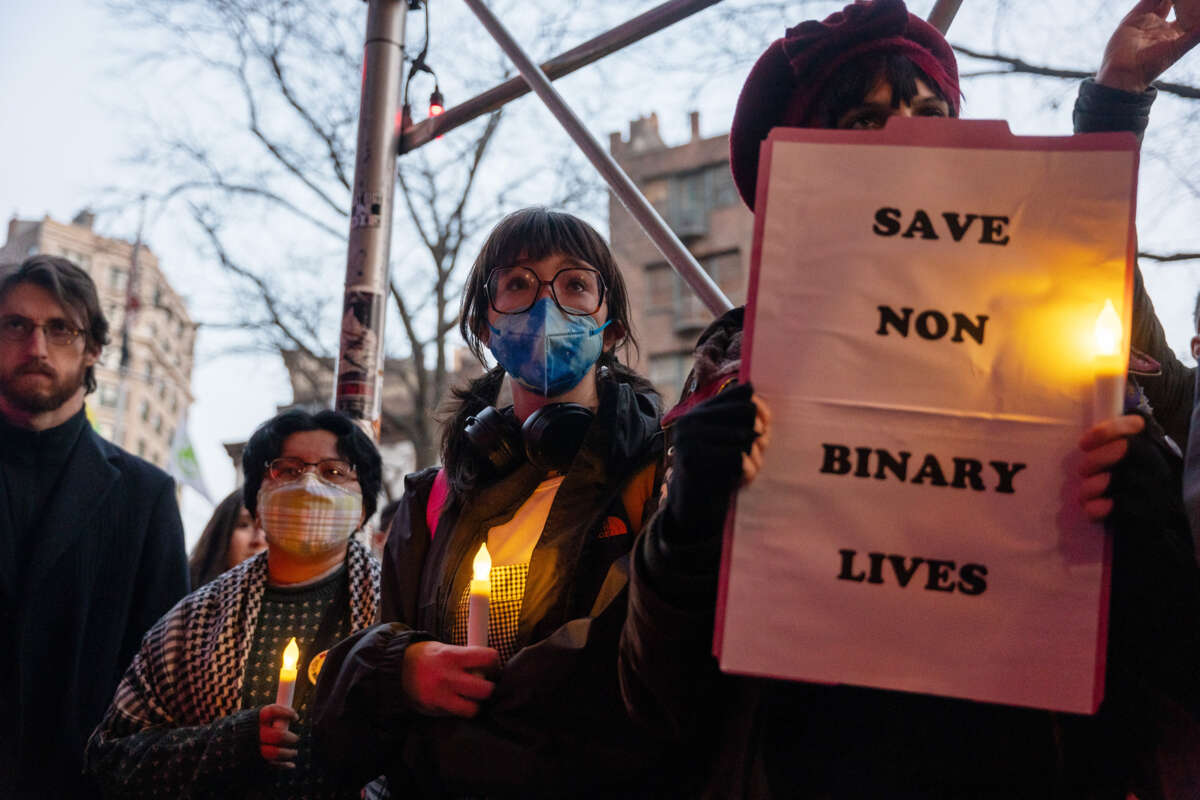Senate Rejects Sanders' Bid to Halt Arms to Israel Over Gaza Atrocities
"Our taxpayer dollars should be used to fund education, housing, and healthcare for Americans, not to support the destruction of innocent lives abroad," said one advocacy leader "deeply saddened" by the votes.
"Our taxpayer dollars should be used to fund education, housing, and healthcare for Americans, not to support the destruction of innocent lives abroad," said one advocacy leader "deeply saddened" by the votes.

An injured child lies on a hospital bed following their forced displacement from the Beit Lahia project in the Gaza Strip on November 20, 2024.
(Photo: Abood Abusalama/Middle East Images/AFP via Getty Images)
Jessica Corbett
COMMON DREAMS
Nov 20, 2024
The U.S. Senate on Wednesday refused to pass joint resolutions of disapproval proposed by Sen. Bernie Sanders that would prevent the sale of certain offensive American weaponry to Israel, which has killed nearly 44,000 Palestinians in Gaza since last fall.
S.J. Res. 111, S.J. Res. 113, and S.J. Res. 115 would have respectively blocked the sale of 120mm tank rounds, 120mm high-explosive mortar rounds, Joint Direct Attack Munitions (JDAMs), the guidance kits attached to "dumb bombs."
The first vote was 18-79, with Sen. Tammy Baldwin (D-Wis.) voting present and Sens. Mike Braun (R-Ind.) and JD Vance (R-Ohio)—the vice-president-elect—not voting. In addition to Sanders (I-Vt.), those in favor were: Sens. Dick Durbin (D-Ill.), Martin Heinrich (D-N.M.), Mazie Hirono (D-Hawaii), Tim Kaine (D-Va.), Angus King (I-Maine), Ben Ray Lujan (D-N.M.), Ed Markey (D-Mass.), Jeff Merkley (D-Ore.), Chris Murphy (D-Conn.), Jon Ossoff (D-Ga.), Brian Schatz (D-Hawaii), Jeanne Shaheen (D-N.H.), Tina Smith (D-Minn.), Chris Van Hollen (D-Md.), Raphael Warnock (D-Ga.), Elizabeth Warren (D-Mass.), and Peter Welch (D-Vt.).
The second vote was 19-78—Sen. George Helmy (D-N.J.) joined those voting for the resolution. The third vote was 17-80.
"What this extremist government has done in Gaza is unspeakable, but what makes it even more painful is that much of this has been done with U.S. weapons and American taxpayer dollars."
Ahead of the votes, Sanders took to the Senate floor to highlight that his resolutions were backed by over 100 groups, including pro-Israel J Street; leading labor organizations such as the Service Employees International Union, United Auto Workers, and United Electrical Workers; humanitarian groups like Amnesty International; and various faith organizations.
"I would also point out that poll after poll shows that a strong majority of the American people oppose sending more weapons and military aid to fund Netanyahu's war machine," the senator said, referring to Israeli Prime Minister Benjamin Netanyahu. "According to a poll commissioned by J Street... 62% of Jewish Americans support withholding weapons shipments to Israel until Netanyahu agrees to an immediate cease-fire."
In addition to stressing that his proposals would not affect any of the systems Israel uses to defend itself from incoming attacks, Sanders argued that "from a legal perspective, these resolutions are simple, straightforward, and not complicated. Bottom line: The United States government must obey the law—not a very radical idea. But unfortunately, that is not the case now."
"The Foreign Assistance Act and the Arms Export Control Act are very clear: The United States cannot provide weapons to countries that violate internationally recognized human rights or block U.S. humanitarian aid," he continued. "According to the United Nations, according to much of the international community, according to virtually every humanitarian organization on the ground in Gaza, Israel is clearly in violation of these laws."
To illustrate the devastating impact of Israel's assault on Gaza—which has led to a genocide case at the International Court of Justice—Sanders quoted from an October New York Timesopinion essay authored by American doctors who volunteered in Gaza. For example, Dr. Ndal Farah from Ohio said: "Malnutrition was widespread. It was common to see patients reminiscent of Nazi concentration camps with skeletal features."
Sanders said that "what this extremist government has done in Gaza is unspeakable, but what makes it even more painful is that much of this has been done with U.S. weapons and American taxpayer dollars. In the last year alone, the U.S. has provided $18 billion in military aid to Israel... and by the way, a few blocks from here, people are sleeping out on the street."
"We have also delivered more than 50,000 tons of military equipment to Israel," he added. "In other words... the United States of America is complicit in all of these atrocities. We are funding these atrocities. That complicity must end, and that is what these resolutions are about."
Merkley, Van Hollen, and Welch joined Sanders in speaking in favor of the resolutions on Wednesday. Members of both parties also spoke out against them: Senate Majority Leader Chuck Schumer (D-N.Y.) and Sens. Ted Budd (R-N.C.), Ben Cardin (D-Md.), Lindsey Graham (R-S.C.), John Kennedy (R-La.), James Risch (R-Idaho), and Jacky Rosen (D-Nev.).
Cardin quoted talking points from the White House that were reported on earlier Wednesday by HuffPost. The outlet detailed how officials in outgoing President Joe Biden's administration suggested that "lawmakers who vote against the arms are empowering American and Israeli foes from Iran to the militant groups Hamas and Hezbollah, which the U.S. treats as terror organizations."
Nov 20, 2024
The U.S. Senate on Wednesday refused to pass joint resolutions of disapproval proposed by Sen. Bernie Sanders that would prevent the sale of certain offensive American weaponry to Israel, which has killed nearly 44,000 Palestinians in Gaza since last fall.
S.J. Res. 111, S.J. Res. 113, and S.J. Res. 115 would have respectively blocked the sale of 120mm tank rounds, 120mm high-explosive mortar rounds, Joint Direct Attack Munitions (JDAMs), the guidance kits attached to "dumb bombs."
The first vote was 18-79, with Sen. Tammy Baldwin (D-Wis.) voting present and Sens. Mike Braun (R-Ind.) and JD Vance (R-Ohio)—the vice-president-elect—not voting. In addition to Sanders (I-Vt.), those in favor were: Sens. Dick Durbin (D-Ill.), Martin Heinrich (D-N.M.), Mazie Hirono (D-Hawaii), Tim Kaine (D-Va.), Angus King (I-Maine), Ben Ray Lujan (D-N.M.), Ed Markey (D-Mass.), Jeff Merkley (D-Ore.), Chris Murphy (D-Conn.), Jon Ossoff (D-Ga.), Brian Schatz (D-Hawaii), Jeanne Shaheen (D-N.H.), Tina Smith (D-Minn.), Chris Van Hollen (D-Md.), Raphael Warnock (D-Ga.), Elizabeth Warren (D-Mass.), and Peter Welch (D-Vt.).
The second vote was 19-78—Sen. George Helmy (D-N.J.) joined those voting for the resolution. The third vote was 17-80.
"What this extremist government has done in Gaza is unspeakable, but what makes it even more painful is that much of this has been done with U.S. weapons and American taxpayer dollars."
Ahead of the votes, Sanders took to the Senate floor to highlight that his resolutions were backed by over 100 groups, including pro-Israel J Street; leading labor organizations such as the Service Employees International Union, United Auto Workers, and United Electrical Workers; humanitarian groups like Amnesty International; and various faith organizations.
"I would also point out that poll after poll shows that a strong majority of the American people oppose sending more weapons and military aid to fund Netanyahu's war machine," the senator said, referring to Israeli Prime Minister Benjamin Netanyahu. "According to a poll commissioned by J Street... 62% of Jewish Americans support withholding weapons shipments to Israel until Netanyahu agrees to an immediate cease-fire."
In addition to stressing that his proposals would not affect any of the systems Israel uses to defend itself from incoming attacks, Sanders argued that "from a legal perspective, these resolutions are simple, straightforward, and not complicated. Bottom line: The United States government must obey the law—not a very radical idea. But unfortunately, that is not the case now."
"The Foreign Assistance Act and the Arms Export Control Act are very clear: The United States cannot provide weapons to countries that violate internationally recognized human rights or block U.S. humanitarian aid," he continued. "According to the United Nations, according to much of the international community, according to virtually every humanitarian organization on the ground in Gaza, Israel is clearly in violation of these laws."
To illustrate the devastating impact of Israel's assault on Gaza—which has led to a genocide case at the International Court of Justice—Sanders quoted from an October New York Timesopinion essay authored by American doctors who volunteered in Gaza. For example, Dr. Ndal Farah from Ohio said: "Malnutrition was widespread. It was common to see patients reminiscent of Nazi concentration camps with skeletal features."
Sanders said that "what this extremist government has done in Gaza is unspeakable, but what makes it even more painful is that much of this has been done with U.S. weapons and American taxpayer dollars. In the last year alone, the U.S. has provided $18 billion in military aid to Israel... and by the way, a few blocks from here, people are sleeping out on the street."
"We have also delivered more than 50,000 tons of military equipment to Israel," he added. "In other words... the United States of America is complicit in all of these atrocities. We are funding these atrocities. That complicity must end, and that is what these resolutions are about."
Merkley, Van Hollen, and Welch joined Sanders in speaking in favor of the resolutions on Wednesday. Members of both parties also spoke out against them: Senate Majority Leader Chuck Schumer (D-N.Y.) and Sens. Ted Budd (R-N.C.), Ben Cardin (D-Md.), Lindsey Graham (R-S.C.), John Kennedy (R-La.), James Risch (R-Idaho), and Jacky Rosen (D-Nev.).
Cardin quoted talking points from the White House that were reported on earlier Wednesday by HuffPost. The outlet detailed how officials in outgoing President Joe Biden's administration suggested that "lawmakers who vote against the arms are empowering American and Israeli foes from Iran to the militant groups Hamas and Hezbollah, which the U.S. treats as terror organizations."
Just hours before the Senate debate, the Biden administration vetoed a United Nations Security Council resolution calling for an immediate cease-fire in Gaza—the fourth time it has blocked such a measure at the world body since the Hamas-led October 7, 2023 attack on Israel.
After the Senate votes, groups that supported Sanders' resolutions expressed disappointment.
Wa'el Alzayat, CEO of the Muslim advocacy group Emgage Action, said in a statement that "we have a moral obligation to stand up for the people of Gaza and demand an end to the constant bombardment they face. I'm deeply saddened that our U.S. senators shot down the joint resolutions calling for a halt in weapons to Israel. Our taxpayer dollars should be used to fund education, housing, and healthcare for Americans, not to support the destruction of innocent lives abroad."
"Continuing to provide Israel with unrestricted military aid to attack innocent civilians in Gaza and Lebanon is a moral failure—one the American government will look back on in horror as the situation gets unimaginably worse," Alzayat added. "While the resolution did not pass this time, we will continue working with lawmakers and allies to advocate for legislation that promotes justice and adherence to international law."
While these resolutions did not advance to the House of Representatives, Demand Progress senior policy adviser Cavan Kharrazian noted that "never before have so many senators voted to restrict arms transfers to Israel, and we are extremely grateful to those who did. This historic vote represents a sea change in how elected Democrats feel about the Israeli military's campaign of death and destruction in Gaza."
"We have all seen with our own eyes the thousands of innocent civilians who have been killed, displaced, and starved by weapons paid for with U.S. tax dollars," Kharrazian said. "Now, almost half of the Senate Democratic caucus is backing up our collective outrage with their votes. Supporters of this destructive war will try to claim victory but even they know that today's vote proves that the movement to end the war is growing, across America and in Congress, and we won't stop."
Center for International Policy executive vice president Matt Duss, who formerly served as Sanders' foreign policy adviser, similarly welcomed the progress, commending those who voted in favor of the resolutions for having "the courage to stand up for U.S. law, the rights of civilians in conflict, and basic decency."
"As civilian deaths, displacement, and disease among Palestinians in Gaza mount alongside open calls for ethnic cleansing by Israeli officials, the Biden administration is not merely failing to act—it is actively enabling the Netanyahu government's war crimes," he continued. "Rather than taking steps to bolster democracy, rights, and rule of law at home and abroad in advance of [President-elect] Donald Trump's second term, President Biden and his top officials are spending their precious last days in office lobbying against measures to protect U.S. interests and vetoing otherwise unanimously supported resolutions in the United Nations Security Council that reflect its own stated policies."
"The lawmakers who stood on the right side of history today will be remembered for their leadership and humanity," he added. "The same cannot be said about President Biden and those who help him abet starvation and slaughter in Gaza."
Today, US senators will be forced to record for posterity whether they condone US enabling of the genocide in Gaza.
By Schuyler Mitchell ,
November 20, 2024

Sen. Bernie Sanders, joined by fellow Senators Chris Van Hollen, Peter Welch and Jeff Merkley, speaks at a news conference on restricting arms sales to Israel at the U.S. Capitol on November 19, 2024, in Washington, D.C.Kevin Dietsch / Getty Images
Truthout is a vital news source and a living history of political struggle. If you think our work is valuable, support us with a donation of any size.
Since last October, Israel has been able to wage a genocidal war on Gaza while receiving little more than a light slap on the wrist. President Joe Biden and his administration have claimed to be working tirelessly toward a ceasefire, all while continuing to supply Israel with the billions of dollars in weapons it needs to prolong its assault.
So, when Biden said last month that the United States would limit arms transfers to Israel if it did not stop blocking the flow of humanitarian aid into Gaza, his threat understandably rang hollow. The administration’s 30-day deadline for Israel to “surge” food and other aid into Gaza has now passed. And, just as predicted, the Biden administration said it will continue sending Israel weapons — even though aid groups like the World Food Programme say conditions in Gaza have only worsened since Biden first floated the possibility of consequences.
This is not only a moral failing, but also a violation of the law. The Foreign Assistance Act and the Leahy Law dictate that the U.S. cannot send weapons to governments committing human rights violations. But time and time again, the U.S. has failed to abide by its own legal code. In 2019, for instance, Donald Trump vetoed a congressional vote to end military support for Saudi Arabia’s war in Yemen, which at that time had killed more than 70,000 people. Shortly after taking office, Biden announced he would halt sales of “offensive weapons” to Saudi Arabia, citing their use in human rights abuses. The arms suspension was a major break from the status quo — but one that was quickly rolled back earlier this year.
The U.S. has also continued to shirk accountability in the case of Israel. The United Nations and Human Rights Watch are among those who have resoundingly documented the rampant violations of human rights that Israel has committed in the last year alone. This includes the systematic destruction of Gaza’s healthcare system through “relentless and deliberate attacks on medical personnel and facilities,” the torture and rape of Palestinians detained in Israeli military camps, deliberate home demolitions, the bombing of safe zones and evacuation corridors, and the forced displacement of 90 percent of Gaza’s population.
The latest evidence that the country is systematically and deliberately blocking humanitarian aid in Gaza arrives months after the International Court of Justice already found it “plausible” that Israel is committing acts of genocide. Citing the humanitarian crisis, hundreds of human rights organizations around the world have called for the U.S. to stop the weapons transfers. But the State Department still claims it doesn’t see a problem.
Truthout is a vital news source and a living history of political struggle. If you think our work is valuable, support us with a donation of any size.
Since last October, Israel has been able to wage a genocidal war on Gaza while receiving little more than a light slap on the wrist. President Joe Biden and his administration have claimed to be working tirelessly toward a ceasefire, all while continuing to supply Israel with the billions of dollars in weapons it needs to prolong its assault.
So, when Biden said last month that the United States would limit arms transfers to Israel if it did not stop blocking the flow of humanitarian aid into Gaza, his threat understandably rang hollow. The administration’s 30-day deadline for Israel to “surge” food and other aid into Gaza has now passed. And, just as predicted, the Biden administration said it will continue sending Israel weapons — even though aid groups like the World Food Programme say conditions in Gaza have only worsened since Biden first floated the possibility of consequences.
This is not only a moral failing, but also a violation of the law. The Foreign Assistance Act and the Leahy Law dictate that the U.S. cannot send weapons to governments committing human rights violations. But time and time again, the U.S. has failed to abide by its own legal code. In 2019, for instance, Donald Trump vetoed a congressional vote to end military support for Saudi Arabia’s war in Yemen, which at that time had killed more than 70,000 people. Shortly after taking office, Biden announced he would halt sales of “offensive weapons” to Saudi Arabia, citing their use in human rights abuses. The arms suspension was a major break from the status quo — but one that was quickly rolled back earlier this year.
The U.S. has also continued to shirk accountability in the case of Israel. The United Nations and Human Rights Watch are among those who have resoundingly documented the rampant violations of human rights that Israel has committed in the last year alone. This includes the systematic destruction of Gaza’s healthcare system through “relentless and deliberate attacks on medical personnel and facilities,” the torture and rape of Palestinians detained in Israeli military camps, deliberate home demolitions, the bombing of safe zones and evacuation corridors, and the forced displacement of 90 percent of Gaza’s population.
The latest evidence that the country is systematically and deliberately blocking humanitarian aid in Gaza arrives months after the International Court of Justice already found it “plausible” that Israel is committing acts of genocide. Citing the humanitarian crisis, hundreds of human rights organizations around the world have called for the U.S. to stop the weapons transfers. But the State Department still claims it doesn’t see a problem.
Today, for the first and probably last time, U.S. Senators will have an opportunity to tell Biden to chart a new course — and honor his own word. Sen. Bernie Sanders (I-Vermont) is bringing six measures, known as the Joint Resolutions of Disapproval, to the Senate floor for a vote. The bills, also backed by Sens. Peter Welch (D-Vermont), Jeff Merkley (D-Oregon) and Brian Schatz (D-Hawaii), would block the sales of six different kinds of weapons to Israel, worth a total of $20 billion.
It’s the first time Congress has voted on legislation blocking arms sales to Israel. Hassan El-Tayyab, an organizer with the Friends Committee on National Legislation, a Quaker peace group, described the vote as “historic.”
“I have met with doctors who have served in Gaza, treating hundreds of patients a day without electricity, anesthesia or clean water, including dozens of children arriving with gunshot wounds to the head,” Sanders wrote in a Washington Post op-ed this week, urging his fellow senators to pass the Joint Resolutions of Disapproval. “As Americans, we are complicit in these horrific and illegal atrocities. Our complicity must end.”
More than 100 civil society organizations have publicly backed the resolutions. Even J Street, which describes itself as a “pro-Israel, pro-peace” group, acknowledged that Israel’s mass killing and starvation of civilians in Gaza is “unacceptable” and expressed support for passing the resolutions in order to send a strong message to Israeli Prime Minister Benjamin Netanyahu.
Still, the Joint Resolutions of Disapproval are unlikely to pass. They would need to be approved by both the House and the Senate to be enacted, with at least a two-thirds majority to prevent the guaranteed presidential veto. But even if the resolutions won’t stop the bloodshed in Gaza, the vote still has a meaningful symbolic importance that will set a congressional precedent.
“Just the fact that this is happening is already sending that political signal,” El-Tayyab told Al Jazeera. “It’s not business as usual.”
All Senate members will now be forced to go on the official legislative record about whether or not they condone the United States’ continued facilitation of a genocide in Gaza. Polls have consistently shown that most Americans want the U.S. to halt weapons sales to Israel, yet our politicians have consistently ignored their constituents’ voices.
On the campaign trail this election cycle, Democrats have tried to fashion themselves as the political party that cares about the democratic process and the rule of law. Today’s vote is an opportunity for Democratic lawmakers to, in a sense, prove it.
In fact, the Biden administration released its own Conventional Arms Transfer policy in February 2023, which expanded the framework for evaluating the legality of arms transfers. The updated policy prohibits the sale of weapons that are “more likely than not” to be used to violate international law and bans arms transfers that “facilitate” or “aggravate risk” or human rights violations. This language is actually stronger than what was previously on the books — “actual knowledge” of violations is not required. The risk of human rights abuses is supposed to be sufficient.
Nine months later, the U.S. authorized more than $14 billion in new Israeli military funding. War crimes were documented within weeks.
It’s the first time Congress has voted on legislation blocking arms sales to Israel. Hassan El-Tayyab, an organizer with the Friends Committee on National Legislation, a Quaker peace group, described the vote as “historic.”
“I have met with doctors who have served in Gaza, treating hundreds of patients a day without electricity, anesthesia or clean water, including dozens of children arriving with gunshot wounds to the head,” Sanders wrote in a Washington Post op-ed this week, urging his fellow senators to pass the Joint Resolutions of Disapproval. “As Americans, we are complicit in these horrific and illegal atrocities. Our complicity must end.”
More than 100 civil society organizations have publicly backed the resolutions. Even J Street, which describes itself as a “pro-Israel, pro-peace” group, acknowledged that Israel’s mass killing and starvation of civilians in Gaza is “unacceptable” and expressed support for passing the resolutions in order to send a strong message to Israeli Prime Minister Benjamin Netanyahu.
Still, the Joint Resolutions of Disapproval are unlikely to pass. They would need to be approved by both the House and the Senate to be enacted, with at least a two-thirds majority to prevent the guaranteed presidential veto. But even if the resolutions won’t stop the bloodshed in Gaza, the vote still has a meaningful symbolic importance that will set a congressional precedent.
“Just the fact that this is happening is already sending that political signal,” El-Tayyab told Al Jazeera. “It’s not business as usual.”
All Senate members will now be forced to go on the official legislative record about whether or not they condone the United States’ continued facilitation of a genocide in Gaza. Polls have consistently shown that most Americans want the U.S. to halt weapons sales to Israel, yet our politicians have consistently ignored their constituents’ voices.
On the campaign trail this election cycle, Democrats have tried to fashion themselves as the political party that cares about the democratic process and the rule of law. Today’s vote is an opportunity for Democratic lawmakers to, in a sense, prove it.
In fact, the Biden administration released its own Conventional Arms Transfer policy in February 2023, which expanded the framework for evaluating the legality of arms transfers. The updated policy prohibits the sale of weapons that are “more likely than not” to be used to violate international law and bans arms transfers that “facilitate” or “aggravate risk” or human rights violations. This language is actually stronger than what was previously on the books — “actual knowledge” of violations is not required. The risk of human rights abuses is supposed to be sufficient.
Nine months later, the U.S. authorized more than $14 billion in new Israeli military funding. War crimes were documented within weeks.

Schuyler Mitchell is a writer, editor and fact-checker from North Carolina, currently based in Brooklyn. Her work has appeared in The Intercept, The Baffler, Labor Notes, Los Angeles Magazine, and elsewhere. Find her on X: @schuy_ler
Report: Biden Admin Lobbying Against Sanders Push to Block Israel Arms Deal
The administration claimed that blocking arms transfers would embolden Hamas — ignoring Israel’s genocidal slaughter.
By Sharon Zhang ,
The administration claimed that blocking arms transfers would embolden Hamas — ignoring Israel’s genocidal slaughter.
By Sharon Zhang ,
November 20, 2024

President Joe Biden speaks in the Roosevelt Room of the White House on October 11, 2024, in Washington, D.C.Andrew Harnik / Getty Images
The Biden administration has levied a strong effort to lobby against a set of resolutions introduced by Sen. Bernie Sanders (I-Vermont) to block several proposed arms sales to Israel ahead of a scheduled vote Wednesday, new reporting finds.
In a memo circulated to the Senate by the White House, obtained by HuffPost, the administration urges senators to vote against the resolutions. The memo claims that voting to block certain weapons to Israel would only empower Hamas and other entities opposed by the U.S. — invoking several such arguments meant to distract from the fact that Israel is making extensive use of U.S.-provided weapons in its genocidal assault of Gaza.
“Disapproving arms purchases for Israel at this moment would … put wind in the sails of Iran, Hezbollah, and Hamas at the worst possible moment,” the memo says, per HuffPost.
“Now is the time to focus pressure on Hamas to release the hostages and stop the war,” the document goes on. “Cutting off arms from Israel would put this goal even further out of reach and prolong the war, not shorten it.”
This line of reasoning is false. Israel is heavily dependent on U.S. weaponry to continue its genocide in Gaza, and Israeli officials have shown no indication that they would stop the assault if the remaining Israeli hostages are released. The memo also said that halting weapons transfers would jeopardize ceasefire talks between Israel and Hezbollah — despite the fact that Israeli leaders have categorically rejected the idea that they would stop their assault of Lebanon.
The White House’s memo is yet another show of the White House’s insistence that it back Israel’s genocide no matter what — to the extent that it is lobbying “aggressively,” as HuffPost reports, to block a set of resolutions that are likely to fail anyway, given the strong support for Israel within Congress. Indeed, despite the administration’s insistence that officials are “tirelessly” working for a ceasefire, the U.S. also vetoed a resolution in the UN Security Council calling for a ceasefire on Wednesday.
The Senate is slated to vote on three of Sanders’s joint resolutions of disapproval on Wednesday, regarding blocking sales of tank rounds, mortar rounds, and JDAMs to Israel. Together, the three sales represent just over $1 billion worth of the weapons in the Biden administration’s proposed $20 billion deal.
Despite widespread evidence that Israel is using these weapons to kill civilians in Gaza and violate international humanitarian law — and strong support from the public to half weapons transfers — just seven senators have so far come out in favor of the resolutions. Experts have repeatedly said that stopping weapons sales to Israel is one of the only ways to stop Israel’s genocidal slaughter in Gaza.
Senate Majority Leader Chuck Schumer (D-New York) is also reportedly asking senators to vote against the legislation — a move that lines up with Senate Minority Leader Mitch McConnell’s plea for colleagues to reject the bid.
Though the resolutions are unlikely to advance to the House, roughly a dozen House Democrats so far have expressed their support for the legislation, saying they would vote for them if given the opportunity. This includes prominent advocates for Palestinian rights like Representatives Rashida Tlaib (Michigan) and Cori Bush (Missouri).
“[President Joe Biden] has refused to enforce US law and stop sending weapons to the Israeli government as they commit genocide in Gaza and use starvation as a weapon of war. Today, every Senator will have to decide if they will vote to uphold our own laws and block arms sales to Israel,” said Rep. Rashida Tlaib (D-Michigan) on social media on Wednesday.
“We urge Senators to support these joint resolutions of disapproval to block specific offensive arms sales to Israel, upholding U.S. law that prohibits arms transfers to countries that engage in a consistent pattern of gross violations of internationally recognized human rights or restrict the delivery of U.S. humanitarian assistance,” said a group of nine Democrats in a joint statement led by Rep. Pramila Jayapal (D-Washington).
The Biden administration has levied a strong effort to lobby against a set of resolutions introduced by Sen. Bernie Sanders (I-Vermont) to block several proposed arms sales to Israel ahead of a scheduled vote Wednesday, new reporting finds.
In a memo circulated to the Senate by the White House, obtained by HuffPost, the administration urges senators to vote against the resolutions. The memo claims that voting to block certain weapons to Israel would only empower Hamas and other entities opposed by the U.S. — invoking several such arguments meant to distract from the fact that Israel is making extensive use of U.S.-provided weapons in its genocidal assault of Gaza.
“Disapproving arms purchases for Israel at this moment would … put wind in the sails of Iran, Hezbollah, and Hamas at the worst possible moment,” the memo says, per HuffPost.
“Now is the time to focus pressure on Hamas to release the hostages and stop the war,” the document goes on. “Cutting off arms from Israel would put this goal even further out of reach and prolong the war, not shorten it.”
This line of reasoning is false. Israel is heavily dependent on U.S. weaponry to continue its genocide in Gaza, and Israeli officials have shown no indication that they would stop the assault if the remaining Israeli hostages are released. The memo also said that halting weapons transfers would jeopardize ceasefire talks between Israel and Hezbollah — despite the fact that Israeli leaders have categorically rejected the idea that they would stop their assault of Lebanon.
The White House’s memo is yet another show of the White House’s insistence that it back Israel’s genocide no matter what — to the extent that it is lobbying “aggressively,” as HuffPost reports, to block a set of resolutions that are likely to fail anyway, given the strong support for Israel within Congress. Indeed, despite the administration’s insistence that officials are “tirelessly” working for a ceasefire, the U.S. also vetoed a resolution in the UN Security Council calling for a ceasefire on Wednesday.
The Senate is slated to vote on three of Sanders’s joint resolutions of disapproval on Wednesday, regarding blocking sales of tank rounds, mortar rounds, and JDAMs to Israel. Together, the three sales represent just over $1 billion worth of the weapons in the Biden administration’s proposed $20 billion deal.
Despite widespread evidence that Israel is using these weapons to kill civilians in Gaza and violate international humanitarian law — and strong support from the public to half weapons transfers — just seven senators have so far come out in favor of the resolutions. Experts have repeatedly said that stopping weapons sales to Israel is one of the only ways to stop Israel’s genocidal slaughter in Gaza.
Senate Majority Leader Chuck Schumer (D-New York) is also reportedly asking senators to vote against the legislation — a move that lines up with Senate Minority Leader Mitch McConnell’s plea for colleagues to reject the bid.
Though the resolutions are unlikely to advance to the House, roughly a dozen House Democrats so far have expressed their support for the legislation, saying they would vote for them if given the opportunity. This includes prominent advocates for Palestinian rights like Representatives Rashida Tlaib (Michigan) and Cori Bush (Missouri).
“[President Joe Biden] has refused to enforce US law and stop sending weapons to the Israeli government as they commit genocide in Gaza and use starvation as a weapon of war. Today, every Senator will have to decide if they will vote to uphold our own laws and block arms sales to Israel,” said Rep. Rashida Tlaib (D-Michigan) on social media on Wednesday.
“We urge Senators to support these joint resolutions of disapproval to block specific offensive arms sales to Israel, upholding U.S. law that prohibits arms transfers to countries that engage in a consistent pattern of gross violations of internationally recognized human rights or restrict the delivery of U.S. humanitarian assistance,” said a group of nine Democrats in a joint statement led by Rep. Pramila Jayapal (D-Washington).




















